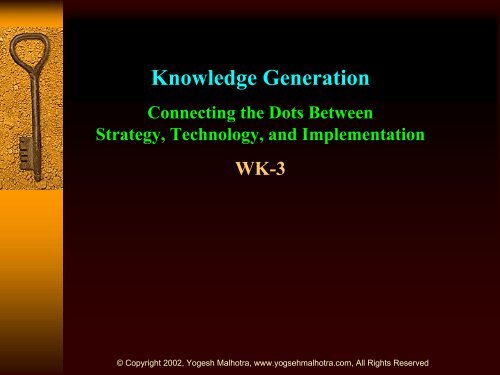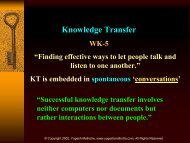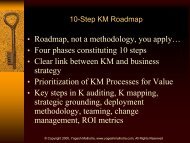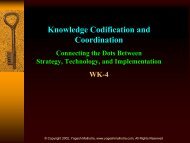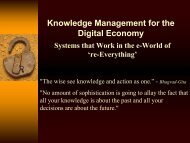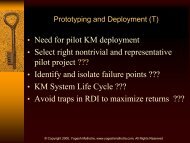Knowledge Generation: Strategy, Technology, and Implementation
Knowledge Generation: Strategy, Technology, and Implementation
Knowledge Generation: Strategy, Technology, and Implementation
You also want an ePaper? Increase the reach of your titles
YUMPU automatically turns print PDFs into web optimized ePapers that Google loves.
<strong>Knowledge</strong> <strong>Generation</strong><br />
Connecting the Dots Between<br />
<strong>Strategy</strong>, <strong>Technology</strong>, <strong>and</strong> <strong>Implementation</strong><br />
WK-3<br />
© Copyright 2002, Yogesh Malhotra, www.yogsehmalhotra.com, All Rights Reserved
Real Time KM for Inventory Management<br />
"If a hammer is sold today at one of Ace<br />
Hardware Corp.'s 5,200 stores, it takes two<br />
days before managers at company<br />
headquarters know about it. So the hardware<br />
chain is implementing an IT system called<br />
Eagle Vision that will provide a real-time link<br />
from the stores' point-of-sale systems that<br />
immediately updates an inventory database at<br />
headquarters."<br />
© Copyright 2002, Yogesh Malhotra, www.yogsehmalhotra.com, All Rights Reserved
© Copyright 2002, Yogesh Malhotra, www.yogsehmalhotra.com, All Rights Reserved
© Copyright 2002, Yogesh Malhotra, www.yogsehmalhotra.com, All Rights Reserved
From Reengineering to “Re-Everything”<br />
OLD<br />
NEW<br />
BPR to KM<br />
ERP / BPR<br />
Inter-Enterprise<br />
Reengineering<br />
Rationalization<br />
“Re-Everything”<br />
Business Model Innovation<br />
Automation<br />
• Internal Business Processes … Inter-enterprise decisions<br />
• ERP ………………. Post-ERP – CRM <strong>and</strong> SCM<br />
• Componentization of ERP Systems<br />
• ERP ………………. EAI, ASPs, Meta-ASPs<br />
© Copyright 2002, Yogesh Malhotra, www.yogsehmalhotra.com, All Rights Reserved
© Copyright 2002, Yogesh Malhotra, www.yogsehmalhotra.com, All Rights Reserved
What is KM – 2 Perspectives from ‘Darwin’<br />
Based upon the ‘Knowing What You Know’<br />
• "<strong>Knowledge</strong> is the right information put into use in the<br />
right way at the right time, whereas information is merely<br />
the amalgamation of various data sets within a specific<br />
context." - Darwin Magazine, July, 2001<br />
• "<strong>Knowledge</strong> management is fundamentally active... people<br />
need to have access to the right information at the right<br />
time. <strong>Knowledge</strong> management needs to be proactive,<br />
tightly integrated with business processes <strong>and</strong> integrally<br />
related to day-to-day operational activities." - Darwin<br />
Magazine, July, 2001<br />
© Copyright 2002, Yogesh Malhotra, www.yogsehmalhotra.com, All Rights Reserved
PRESENCE AWARENESS & IM => FOR KM<br />
© Copyright 2002, Yogesh Malhotra, www.yogsehmalhotra.com, All Rights Reserved
<strong>Knowledge</strong> <strong>Generation</strong><br />
• Information, <strong>Knowledge</strong> <strong>and</strong> Actions<br />
– Based on Experiences, Values, Rules<br />
• Conscious <strong>and</strong> Intentional K generation<br />
• Five modes of knowledge generation:<br />
– Acquisition<br />
– Dedicated Resources<br />
– Fusion<br />
– Adaptation<br />
– <strong>Knowledge</strong> Networking<br />
© Copyright 2002, Yogesh Malhotra, www.yogsehmalhotra.com, All Rights Reserved
K <strong>Generation</strong> – Process or ‘Thing’: Acquisitions<br />
• NIH Syndrome – Other Extreme<br />
• Acquiring other firms, practices, individuals<br />
• Minds more valuable than their creations??<br />
• K <strong>and</strong> talent – not related to degrees??<br />
• Valuation of companies – difficult!<br />
• Organic connection of K to particular<br />
people <strong>and</strong> environment “stickiness”<br />
• Ecology of <strong>Knowledge</strong><br />
© Copyright 2002, Yogesh Malhotra, www.yogsehmalhotra.com, All Rights Reserved
© Copyright 2002, Yogesh Malhotra, www.yogsehmalhotra.com, All Rights Reserved
© Copyright 2002, Yogesh Malhotra, www.yogsehmalhotra.com, All Rights Reserved
© Copyright 2002, Yogesh Malhotra, www.yogsehmalhotra.com, All Rights Reserved
© Copyright 2002, Yogesh Malhotra, www.yogsehmalhotra.com, All Rights Reserved
Dedicated Resources<br />
• Contrast with ‘renting’ the brains<br />
• R&D, Competency development groups,<br />
technology research centers, Xerox PARC<br />
• Stickiness to dedicated centers may pose<br />
problems – gap between r&d <strong>and</strong> execution<br />
© Copyright 2002, Yogesh Malhotra, www.yogsehmalhotra.com, All Rights Reserved
Fusion<br />
• ‘Creative Abrasion’ <strong>and</strong> ‘Creative Conflict’<br />
• Innovation occurs at the boundaries<br />
between mind-sets, not within…<br />
• ‘Requisite variety’ <strong>and</strong> creative chaos<br />
• Redundancy, routine innovation <strong>and</strong><br />
spillover effects ??<br />
• How often executives question ‘what they<br />
know’?<br />
© Copyright 2002, Yogesh Malhotra, www.yogsehmalhotra.com, All Rights Reserved
Adaptation<br />
• Self-organizing <strong>and</strong> CASs<br />
• Success traps <strong>and</strong> the winner’s curse<br />
• Learning <strong>and</strong> unlearning – organizations<br />
• “Why fix when it ain’t broken!”<br />
• Anticipation of surprise – proactive change<br />
• Developing Requisite Variety – openness to<br />
learning, change <strong>and</strong> adaptation<br />
© Copyright 2002, Yogesh Malhotra, www.yogsehmalhotra.com, All Rights Reserved
Networks<br />
• Informal, self-organizing networks<br />
• Communities of knowers, COPs<br />
• Formal networks versus informal networks?<br />
• Teams versus Communities of practice??<br />
• Informal knowledge sharing – how to<br />
enable it – role of technologies <strong>and</strong> of other<br />
factors… (Hoeschst example)<br />
© Copyright 2002, Yogesh Malhotra, www.yogsehmalhotra.com, All Rights Reserved
New <strong>Knowledge</strong> – Old <strong>Knowledge</strong><br />
Obstacles create opportunities, in his view. In<br />
fact, according to the author, we need<br />
ambiguity to create profit. "Common risks lead<br />
to common returns," he writes. "The<br />
opportunity to profit comes from uncertainty."<br />
Careful to distinguish profiting from<br />
profiteering, he says the goal of industry<br />
decision makers should not be to capitalize on<br />
hardship or heartbreak, but to benefit from<br />
anticipating <strong>and</strong> preparing for the possibilities.<br />
© Copyright 2002, Yogesh Malhotra, www.yogsehmalhotra.com, All Rights Reserved
New <strong>Knowledge</strong> – Old <strong>Knowledge</strong><br />
KM is "obsoleting what you know before<br />
others obsolete it <strong>and</strong> profit by creating the<br />
challenges <strong>and</strong> opportunities others haven't<br />
even thought about“- Yogesh Malhotra<br />
- Quoted in The Data is Key!, Defense Information<br />
Systems Agency (DISA) Interoperability, Directorate,<br />
United States Navy Presentation to CALS/EC<br />
International Symposium, January 2001,Tokyo, Japan.<br />
© Copyright 2002, Yogesh Malhotra, www.yogsehmalhotra.com, All Rights Reserved
New <strong>Knowledge</strong> – Old <strong>Knowledge</strong><br />
"Many definitions exist for knowledge<br />
management. If one were to explore a common<br />
theme however, it would be that markets <strong>and</strong><br />
consumer dem<strong>and</strong> are not static, nor are they<br />
fixed. The environment in which we do business<br />
is constantly changing, <strong>and</strong> changing at an<br />
increasingly faster rate. To meet the needs of this<br />
rapidly changing environment, an organization<br />
must be aware, flexible, responsive, <strong>and</strong> proactive<br />
in seeking that which is new or which is yet to be,<br />
thus be prepared for new <strong>and</strong> emerging business<br />
models…” [continued] - Verisign White Paper<br />
© Copyright 2002, Yogesh Malhotra, www.yogsehmalhotra.com, All Rights Reserved
New <strong>Knowledge</strong> – Old <strong>Knowledge</strong><br />
"This is reflective of Dr. Yogesh Malhotra's<br />
suggestion that companies should "profit by<br />
creating the challenges <strong>and</strong> opportunities others<br />
haven't even thought about." Strategic efficiency,<br />
founded in effective communication, planning,<br />
<strong>and</strong> decision making at every level of the<br />
organization, is the only way to achieve this goal.<br />
<strong>Knowledge</strong> Management, in turn, drives strategic<br />
efficiency, not only through technological efforts<br />
but also, <strong>and</strong> more importantly, through the<br />
efforts of the employees within the organization."<br />
- Verisign White Paper<br />
© Copyright 2002, Yogesh Malhotra, www.yogsehmalhotra.com, All Rights Reserved
New <strong>Knowledge</strong> – Old <strong>Knowledge</strong><br />
"However as Malhotra says, "the new business<br />
model in the Information Age is marked by<br />
fundamental, not incremental change. Businesses<br />
can't plan long-term; instead, they must shift to a<br />
more flexible 'anticipation of surprise' model.<br />
Thus it is impossible to build a system that<br />
predicts who the right person at the right time<br />
even is, let alone what constitutes the right<br />
information."<br />
- Quoted in <strong>Knowledge</strong> Management - The Evolution Of Man<br />
And Machine, <strong>Knowledge</strong> Management, Corporate Portal<br />
Series, Microsoft Corporation, Europe<br />
© Copyright 2002, Yogesh Malhotra, www.yogsehmalhotra.com, All Rights Reserved
From Information to <strong>Knowledge</strong><br />
• <strong>Knowledge</strong>, Information, Data<br />
• K versus I; KM versus IM ??<br />
• Tacit <strong>Knowledge</strong> <strong>and</strong> Explicit <strong>Knowledge</strong>??<br />
• Relate to Change… SR – UN ??<br />
• Information <strong>and</strong> Noise ?? Construction of<br />
Meaning versus Processing of Information<br />
• Too much data… too little wisdom<br />
© Copyright 2002, Yogesh Malhotra, www.yogsehmalhotra.com, All Rights Reserved
‘K’ for ‘A’<br />
Myths About <strong>Knowledge</strong> Management<br />
Information vs. <strong>Knowledge</strong><br />
• MYTH: KM technologies deliver the right<br />
information to the right person at the right time<br />
• MYTH: KM technologies can store human<br />
intelligence <strong>and</strong> experience<br />
• MYTH: KM technologies can distribute human<br />
intelligence<br />
“<strong>Knowledge</strong> management is in danger of being perceived as so<br />
seamlessly entwined with technology that its true critical success<br />
factors will be lost in the pleasing hum of servers, software <strong>and</strong><br />
pipes.”<br />
-- Does KM=IT?, CIO Magazine, Sep. 15, 1999<br />
© Copyright 2002, Yogesh Malhotra, www.yogsehmalhotra.com, All Rights Reserved
Beyond Information Flow to K Flow<br />
• HP – Moving its ‘best practices’<br />
• Tacit <strong>Knowledge</strong> <strong>and</strong> Explicit <strong>Knowledge</strong><br />
• Subjective Tacit <strong>Knowledge</strong> (based on<br />
experience) to Objective Explicit<br />
<strong>Knowledge</strong> ??? - RS - NU<br />
• Three fundamental steps: ??<br />
– K Acquisition<br />
–K Sharing<br />
– K Utilization<br />
© Copyright 2002, Yogesh Malhotra, www.yogsehmalhotra.com, All Rights Reserved
Professional Intellect: Know What to Care Why<br />
• ‘Care-Why’ – W - Insights<br />
• ‘Know-Why’ – K - Expertise<br />
• ‘Know-How’ – I - Experience<br />
• ‘Know-What’ – Data – ‘Bookish<br />
knowledge’<br />
• Motivation, commitment, intrinsic nature of<br />
K-W<br />
© Copyright 2002, Yogesh Malhotra, www.yogsehmalhotra.com, All Rights Reserved
<strong>Knowledge</strong> Utilization<br />
• Telephone as role model of KMS???<br />
• Of Telephones <strong>and</strong> CrossPads….<br />
• Supporting Informal <strong>Knowledge</strong> – Amazon<br />
• Perils of Excessive Formalization – RS /<br />
NU ??<br />
© Copyright 2002, Yogesh Malhotra, www.yogsehmalhotra.com, All Rights Reserved
Differences: Data Warehouses <strong>and</strong> KMS<br />
• Types of Information Managed<br />
• Context<br />
• Size<br />
• Content Focus<br />
• Performance<br />
• Networks<br />
© Copyright 2002, Yogesh Malhotra, www.yogsehmalhotra.com, All Rights Reserved
Differences: KMS, Intranet <strong>and</strong> Extranet<br />
• Content Focus<br />
• Performance<br />
• Broader Base (confusion: BI <strong>and</strong> DA)<br />
• Reciprocity – How to develop? Silver<br />
bullets?<br />
• Is this one the silver bullet?<br />
© Copyright 2002, Yogesh Malhotra, www.yogsehmalhotra.com, All Rights Reserved
How Companies Learn to Learn<br />
• <strong>Knowledge</strong>-Friendly Companies<br />
• <strong>Knowledge</strong>-Sharing Companies<br />
• Is Your Company Ready for KM?<br />
– Performance gaps<br />
–Metrics<br />
– Corporate Culture<br />
– <strong>Knowledge</strong> Champions<br />
– Strategic Alignment Of 4Cs <strong>and</strong> 5Cs!<br />
© Copyright 2002, Yogesh Malhotra, www.yogsehmalhotra.com, All Rights Reserved


